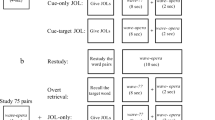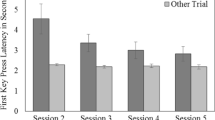Abstract
The present studies were undertaken to examine the effects of manipulating delay-interval task (Study 1) and timing of feedback (Study 2) on acquisition and retention. Participants completed a 100-item cumulative final examination, which included 50 items from each laboratory examination, plus 50 entirely new items. Acquisition and retention were examined in Study 1 in which delayinterval task, length of delay until feedback was delivered, and the opportunity to answer until correct (AUG) were manipulated and, in Study 2, in which the number of items completed before feedback was delivered and AUC were manipulated. Delays longer than 5 s negatively affected learning (Study 1) when participants engaged in a delay-interval distraction task; enhancement was observed when individual test items and correct responses were reviewed during the interval. Significant decrements in learning were observed in Study 2 in the absence of a distraction task when more than 1 test item was completed prior to the delivery of feedback. The present outcomes add to the growing body of evidence that retention is maximized when test items are completed individually and exited with knowledge of the correct response, that the opportunity to answer until correct minimizes perseverative inaccurate responding and, for multiple-choice test items, that immediate feedback is a more effective facilitator of retention than delayed feedback.
Similar content being viewed by others
References
BEESON, R. O. (1973). Immediate knowledge of results and test performance. The Journal of Educational Research, 66, 224–226.
BRACKBILL, Y., ADAMS, G., & REANEY, T. P. (1967). A parametric study of the delay-retention effect. Psychological Reports, 20, 433–434.
BRACKBILL, Y., BRAVOS, A., & STARR, R. H. (1962). Delay-improved retention of a difficult task. Journal of Comparative and Physiological Psychology, 55, 947–952.
BROSVIC, G. M., EPSTEIN, M. L., DIHOFF, R. E., & COOK, M. J. (2005). Efficacy of error for the correction of initially incorrect assumptions and of feedback for the affirmation of correct responding: Learning in the classroom. The Psychological Record, 55, 401–418.
BROSVIC, G. M., EPSTEIN, M. L., DIHOFF, R. E., & COOK, M. J. (2006a). Feedback facilitates the acquisition and retention of numerical fact series by elementary school students with mathematics learning disabilities. The Psychological Record, 56, 35–54.
BROSVIC, G. M., EPSTEIN, M. L., DIHOFF, R. E., & COOK, M. J. (2006b). Acquisition and retention of Esperanto: The case for error correction and immediate feedback. The Psychological Record, 56, 205–218.
DIHOFF, R. E., BROSVIC, G. M., & EPSTEIN, M. L. (2003). The role of feedback during academic testing: The delay-retention effect revisited. The Psychological Record, 53, 533–548.
DIHOFF, R. E., BROSVIC, G. M., EPSTEIN, M. L. & COOK, M. J. (2004). Provision of feedback during preparation for academic testing: Learning is enhanced by immediate but not delayed feedback. The Psychological Record, 54, 207–231.
DIHOFF, R. E., BROSVIC, G. M., EPSTEIN, M. L., & COOK, M. J. (2005). Adjunctive role for immediate feedback in the acquisition and retention of mathematical fact series by elementary school students classified with mild mental retardation. The Psychological Record, 55, 39–66.
EPSTEIN, M. L., BROSVIC, G. M., DIHOFF, R. E., LAZARUS, A. D., & COSTNER, K. L. (2003). Effectiveness of feedback during the testing of preschool children, elementary school children, and adolescents with developmental delays. The Psychological Record, 53, 177–195.
EPSTEIN, M. L., LAZARUS, A. D., CALVANO, T. B., MATTHEWS, K. A., HENDEL, R. A., EPSTEIN, B. B., & BROSVIC, G. M. (2002). Immediate feedback assessment technique promotes learning and corrects inaccurate first responses. The Psychological Record, 52, 187–201.
KULHAVY, R. W., & ANDERSON, R. C. (1972). Delay-retention effects with multiple choice tests. Journal of Educational Psychology, 63, 505–512.
RANKIN, R. J., & TEPPER, T. (1978). Retention and delay of feedback in a computerassisted instructional task. Journal of Experimental Education, 46, 67–70.
SWINNEN, S. P., SCHMIDT, R. A., NICHOLSON, D. E., & SHAPIRO, D. C. (1990). Information feedback for skill acquisition: Instantaneous knowledge of results degrades learning. Journal of Experimental Psychology: Learning, Memory, and Cognition, 16, 706–716.
SURBER, J. R., & ANDERSON, A. C. (1975). Delay-retention effect in natural classroom settings. Journal of Educational Psychology, 67, 170–173.
WELLS, J. C. (1992). Concise Esperanto and English dictionary. New York: McGraw-Hili.
Author information
Authors and Affiliations
Corresponding author
Rights and permissions
About this article
Cite this article
Brosvic, G.M., Epstein, M.L., Dihoff, R.E. et al. Retention of Esperanto is Affected by Delay-Interval Task and Item Closure: A Partial Resolution of the Delay-Retention Effect. Psychol Rec 56, 597–615 (2006). https://doi.org/10.1007/BF03396036
Published:
Issue Date:
DOI: https://doi.org/10.1007/BF03396036




